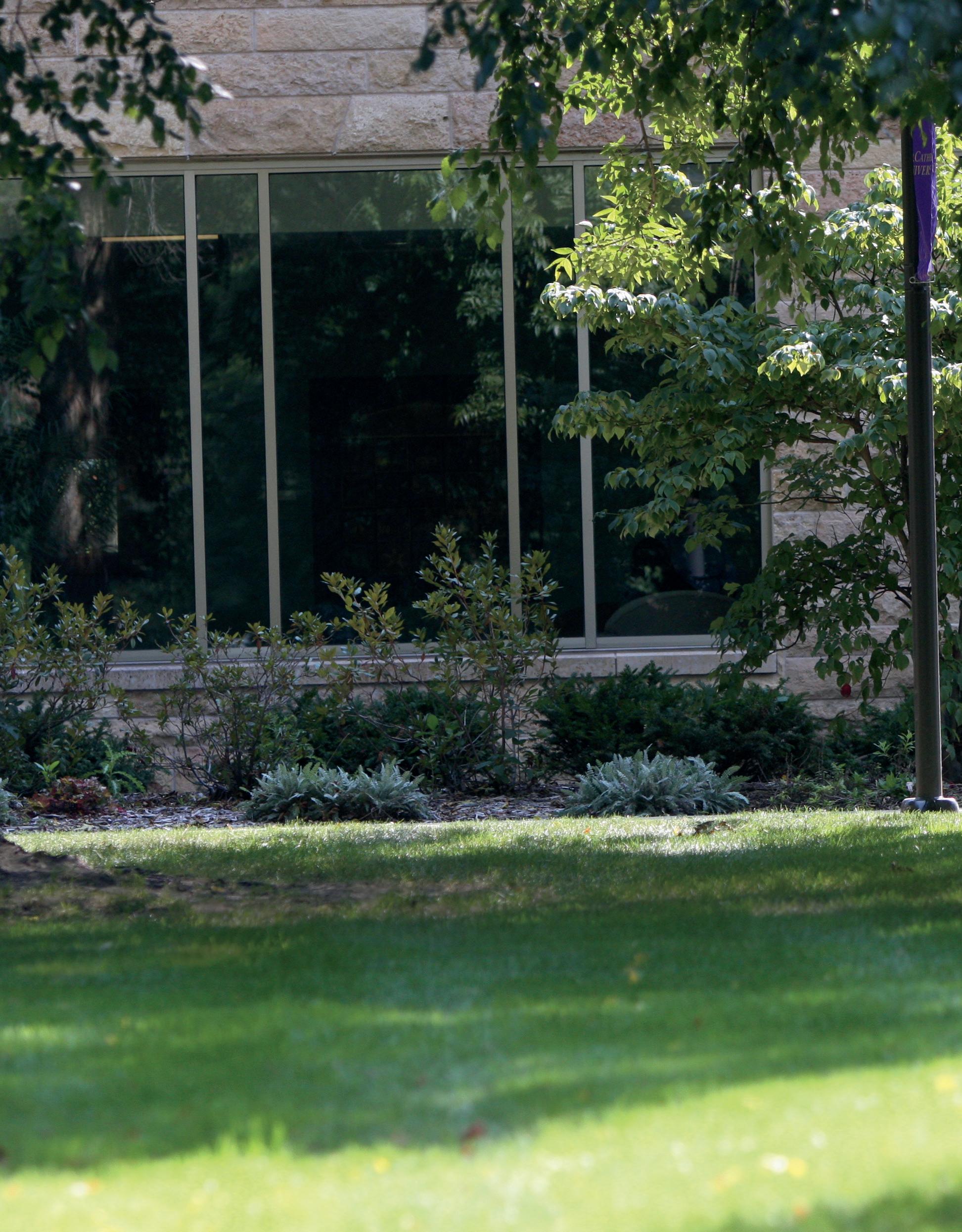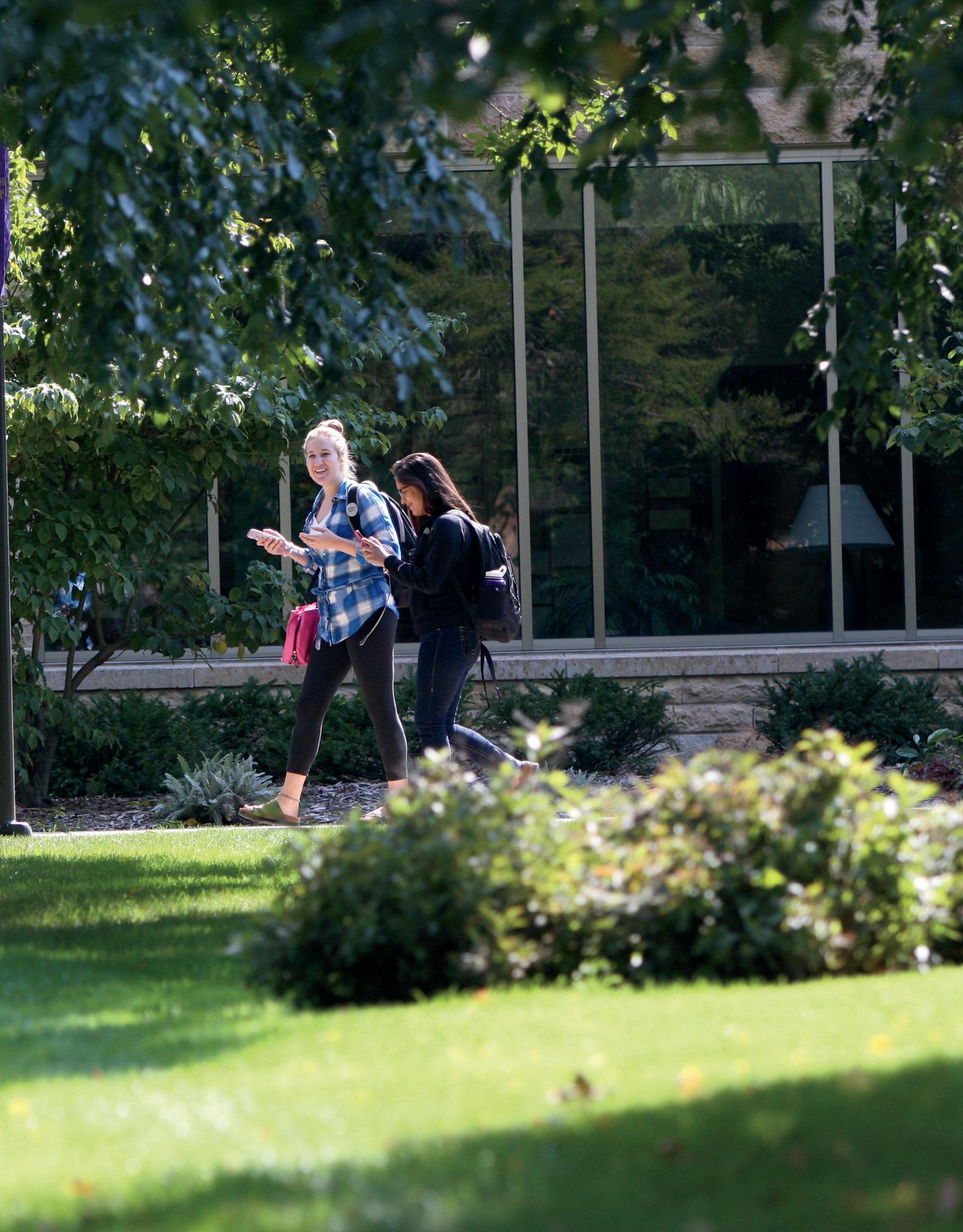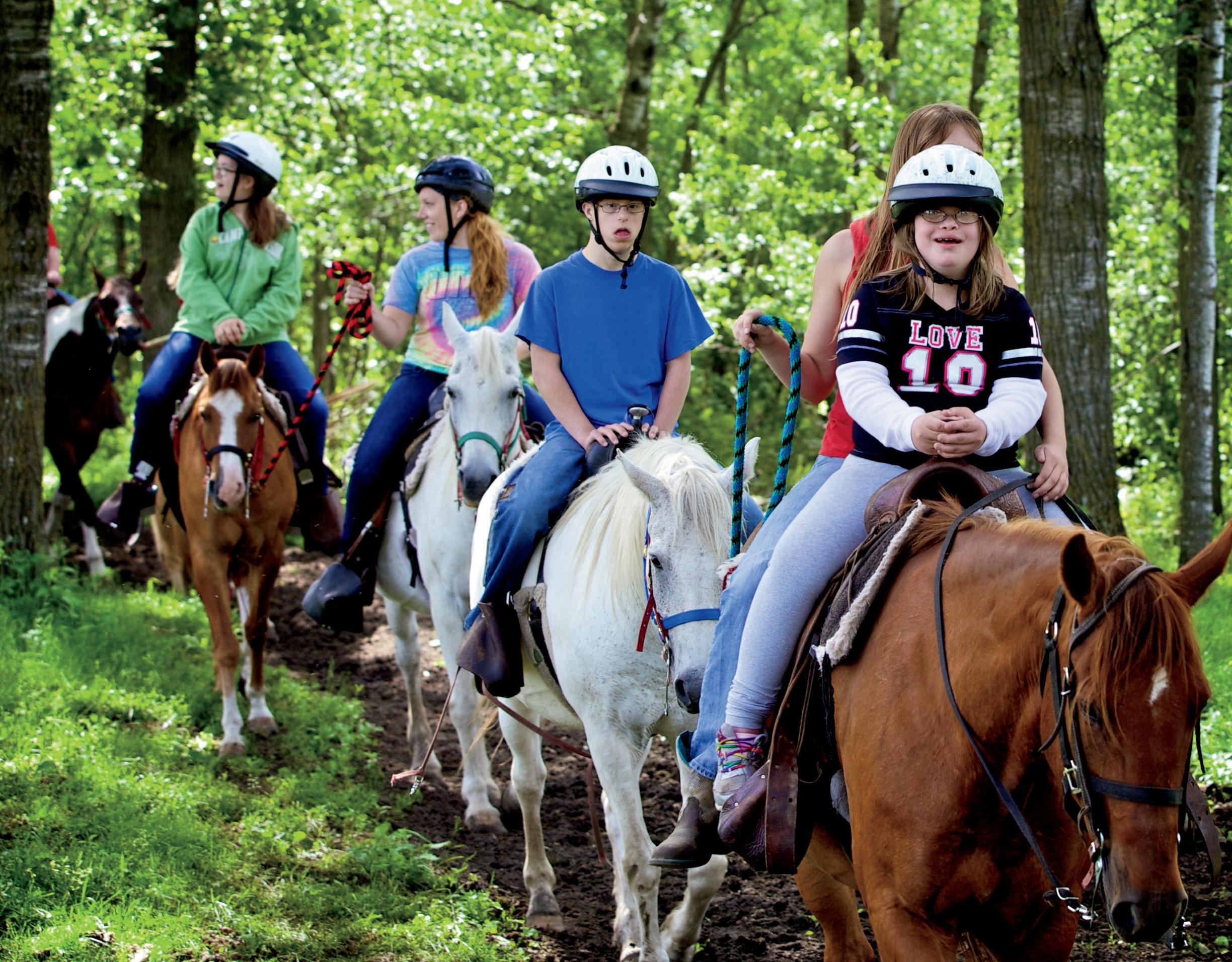
10 minute read
Making Summer Count
Making Summer Count Students stay on campus in the summer to catch up, get ahead and enjoy what the Twin Cities has to offer.
BY SUZY FRISCH
Cora Lundquist is on a mission to graduate from St. Catherine University in three years. Entering college as a first-year student last fall, she’s technically a sophomore from credits earned during high school. Thanks to St. Kate’s Summer Session, Lundquist has her objective in sight. The University offers robust summer courses, affordable campus living and fun summer activities that keep students thriving during the warm months.
St. Kate’s launched a concerted effort to help students get ahead, catch up or stay on track to earning their degrees three years ago. It ramped up publicity, added more courses and expanded out-of-class programming to encourage students to stick around. The University also introduced summer start dates in 2015 for some programs to offer students more flexibility.
“For students who feel like they are a little behind or they want to have balance in their life, they can take a class in the summer and not be so crazy during the school year. Or they can dive into just one class and concentrate on that in the summer,” says Lizette Bartholdi, director of academic advising.

MORE THAN 1,600 STUDENTS ARE ENROLLED IN ST. KATE’S SUMMER SESSION THIS YEAR. CARLOSHA BLANCHE M’16 IS AMONG THEM.
Lundquist, a native of Pine City, Minnesota, is majoring in business administration with a focus on marketing and management. She recently added minors in sales and integrated marketing communications. To fit in all of her coursework, she’s taking classes in managerial accounting and business law during Summer Session. She also aims to land an internship and work as much as possible at an off-campus job while living in a residence hall.
“I received an email a month or so ago and found out St. Kate’s Summer Session was offering classes that I needed anyway, and they were cheaper than fall or spring,” she says. “Also, I was planning to stay on campus for work, so I might as well take them now. This way, I’m still set to graduate in three years.” Lundquist already plans to return next summer.
SUMMER LEARNING
Summer courses usually cover the same amount of material discussed in a regular semester, but in less time. The University offers three options — a session that begins in early June and goes until mid August, another that goes from early June to early July, and one more starting in July and ending mid August. Summer Session is open to associate, undergraduate, graduate and evening/weekend/online (EWO) students, who pick from a rich variety of courses.
Some students tackle a challenging course in their major so they can give it their full attention, while others explore a budding area of interest such as “Beginning Sanskrit,” “Ceramics” or “Women in Greece and Rome.” Many take required, high-demand courses like “Biology of Women” to ensure they can get in and complete it on schedule. Other students use Summer Session as a way to lighten their load during the traditional academic year, when they may have an internship or fieldwork.
St. Kate’s offers summer courses on its St. Paul and Minneapolis campuses, as well as online. It’s a great option for students who go home during that season or for those who balance school and work, Bartholdi says. “Summer classes are smaller and more intensive, but they have a relaxed atmosphere,” she adds.
And students aren’t the only ones to benefit. Faculty often use Summer Session as an opportunity to explore new teaching methods or to become more creative with their existing education models. They are also more likely to hold a class outside. Popular spots are by Dew Drop Pond and in the English Garden.
For students interested in international experiences, summer brings the chance to learn and be part of life somewhere else — be it Argentina, Botswana or India — or to travel with their favorite professors and assist them with a research project. Every summer since 2005, Jill Welter, Ph.D., associate professor of biology, brings undergraduates to the Eel River Watershed in northern California to conduct stream research. In 2012, she led a team to study climate warming in Iceland for seven weeks.
At St. Kate’s, students can choose from more than 150 study abroad programs in over 50 countries. Summer, J-term, semester and yearlong programs all offer academic credit toward a student’s electives.
“[Study abroad] exposes students to people who might think differently or have a different way of doing things,” says Raine de Campeau, director of the Office of Global Studies. “And they start to look at things differently as well. I see a real shift in confidence and independence.”
SUMMER LIVING
On top of making progress toward a degree, students benefit in other ways. Those who live on campus gain roughly a 30 percent discount. The University allows students to live in campus housing all summer even if they aren’t taking courses, says Sabrina Anderson, associate director of residence life.
“Living on campus costs less from June to August because we know some students can’t afford this extra expense. They’re either not getting financial aid or

they need to save money to pay their tuition in the fall,” says Anderson. “We want to make summer housing as affordable as possible to help our students breathe a little easier. Plus, we want to encourage students to stay on campus because it’s so beautiful here in the summer and they keep our community vibrant.”
Whenever possible, her staff aims to minimize moving by placing summer students in their upcoming fall spaces. Options include Morrison, Alberta and Georgia residence halls, where suites offer kitchenettes and apartments include full kitchens.
Having a great place to prepare your own meals or entertain friends isn’t the only summer living amenity at St. Kate’s. The dining room stays open over the summer (with limited hours), along with the library, bookstore, post office and interfaith prayer room in Campus Ministry. Students can access drop-in tutoring sessions at the O’Neill Center, and use disability resources for free. They can get their hearts pumping at the Butler fitness center or pool just like they do in the fall and spring.
Brigette Marty, associate director of student center and activities, and her team are known for merrymaking at St. Kates. They screen free movies on the quad. They host picnics and barbeques. And their Summer Surprises series even draws faculty and staff out of their offices. As its name suggests, very few ever know what to expect. Take last year, for example: after voting on their favorite pies (key lime, apple, cherry, French silk and pecan) the crowd in Coeur de Catherine tucked into 300 free slices while catching up with old friends and meeting new ones. On another midsummer day, the St. Kate’s community cooled off with lemonade and decorated mason jars to calypso music.
Students also expand their horizons or get their scream on with discounted passes to museums and the Valleyfair amusement park. Last summer, several students joined alumnae and their families at CHS Field for a St. Paul Saints game.
“The Twin Cities is a great place to be in the summer, and we want to help students explore,” says Marty. And then, of course, there is the beauty of campus, which really shines in the warmer months.
“The flowers are blooming, and everything is so green and lush,” Marty adds. “That creates a new sense of calm with students. I don’t see them as frantic and harried as I do during the school year.”
Summer Session at St. Kate’s is a time like no other. Students revel in a singular mix of focused academics, summer fun and convenient living in the heart of a vibrant, happening campus. Summer students have it all, and they keep coming back for more.

Coming Full Circle
Alumna continues lifelong commitment to education and service at Camp Knutson.
BY ELIZABETH OTTO
Mary Kay “Kate” Williams ’60 first served as a camp counselor while she was a student at St. Kate’s, and it was this Catholic girls’ camp in Crosslake, Minnesota that sparked her interest in biology and inspired her to become a teacher. Now, after a decades-long career in education, Williams can be found each summer on that very same lake as the assistant director of Camp Knutson — a very different camp than the one she attended as a Katie. Working at Camp Knutson allows Williams to integrate her passion for nature and education with the commitment to service instilled in her at St. Kate’s. The camp, according to its mission statement, “is dedicated to nurturing the well-being of persons with special needs in a setting which celebrates God’s love for community and creation.” Williams estimates that in summer 2016 it will welcome about 650 children with unique needs
TRAIL RIDING IS ONE OF MANY SUMMER ACTIVITIES AT CAMP KNUTSON. MARY KAY WILLIAMS ’60 BELIEVES IN THE THERAPEUTIC VALUE AND MEANINGFUL CONNECTIONS THAT HORSEBACK RIDING PROVIDES HER CAMPERS.
related to heart disease, skin disorders, autism, Down syndrome and HIV/AIDS, accompanied by more than 400 support staff.
“We’re into making a safe place for kids, providing them with an environment in which they can be loved and cared for, and experience things that they wouldn’t get a chance to do otherwise,” she explains.
Former Camp Knutson counselor Rebecca Bjorke ’14, MAOT’15, says the camp’s emphasis on providing a setting where all people are valued is a reflection of Williams’ own principles. “Serving others is always on the forefront of Kate’s mind,” she adds, noting that Williams is deeply motivated by Catholic Social Teaching.
“I was raised in parochial schools, and was taught by Dominicans in the first eight years of my grade school,” says Williams. “Then I was at the Academy of Holy Angels, which was owned and operated by the Sisters of St. Joseph of Carondelet.” As a result, the call to serve our neighbor was integrated into her early learning. Williams attended St. Kates, just as her mother (a 1937 graduate) did. It was a natural fit, because the University’s mission aligned with her values.
For 20 years after earning a bachelor’s degree in biology, Williams taught at Regina Catholic High School for girls in Minneapolis. Her work and many conversations with the Dominican nuns only further fueled her passion for social justice. She went on to teach science at Minneapolis Community College and, as a master gardener with the University of Minnesota Extension Service, create closedcircuit broadcasts about plants and the natural world for patients at the university’s Children’s Hospital.
Williams became involved with Camp Knutson by coincidence. She grew concerned after reading in a local newspaper that the camp’s owner, Lutheran Social Service of Minnesota (LSS), wanted to sell it. Her chance to do something came one evening at the opera in St. Paul, when she overheard Mark Peterson, the chief executive officer of LSS, speaking with someone about the pending sale.
“I said to my husband, ‘Don’t talk to me; I’m eavesdropping,’” recalls Williams. She was retired at the time but spending her days as a beekeeper — an interest that developed at St. Kate’s, by the way, when she wrote her senior paper about social insects.
Williams worked her way into Peterson’s conversation and urged him to preserve the land and continue offering camping experiences because “the value of camping for individuals is profound,” she notes. Peterson connected Williams and her husband with a development director at LSS. Together, along with other worried neighbors, the group made a plan to raise funds for the camp. Williams co-chaired the advisory board and eventually became one of its leaders.
Williams finds Camp Knutson, 20 feet across the channel from where she was first inspired to teach and study biology, the perfect place to complete her enduring love of nature and serving others. “My life has come full circle, really,” she says.
Elizabeth Otto is an assistant professor of communication studies at St. Kate’s.


